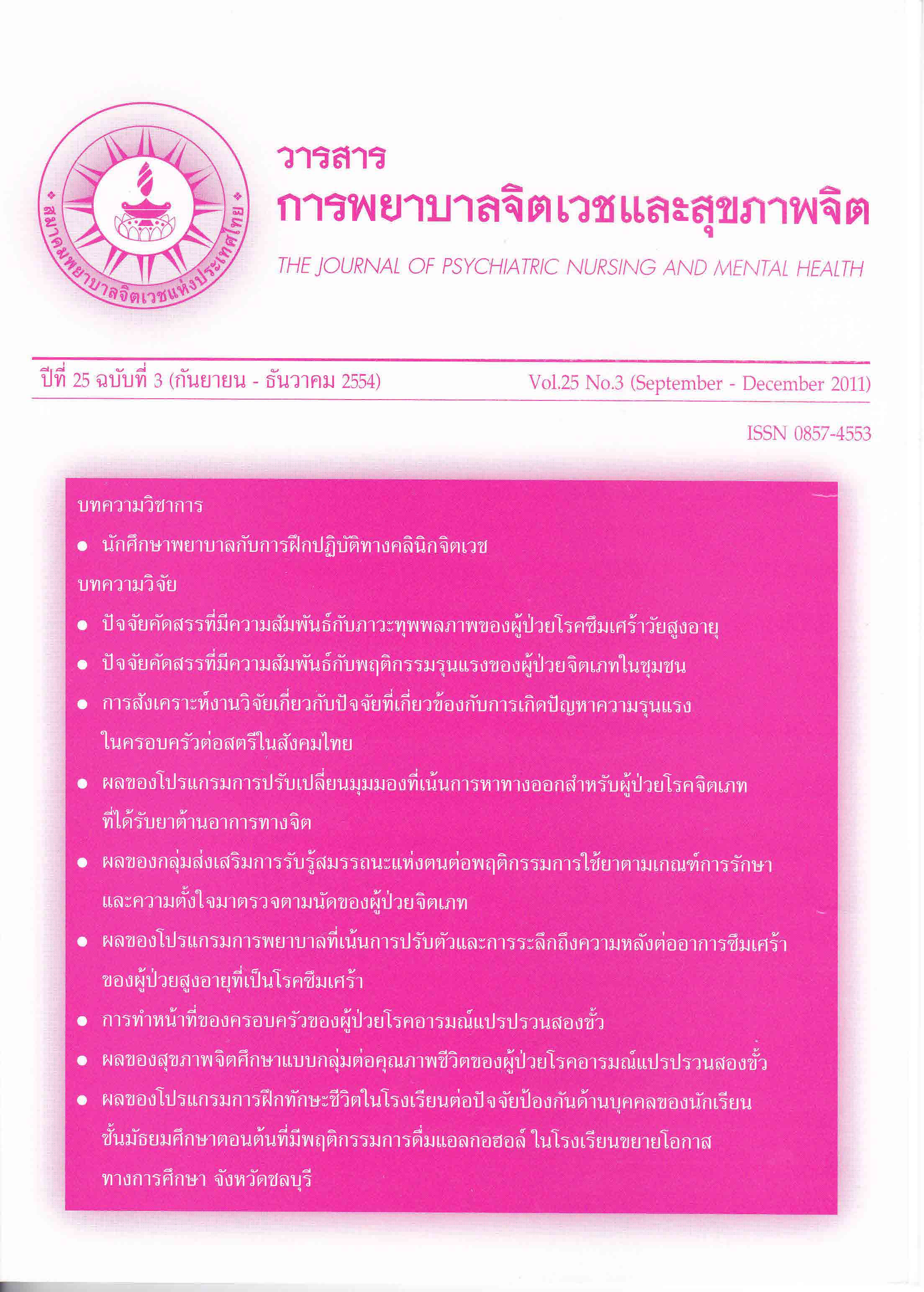ผลของโปรแกรมการฝึกทักษะชีวิตในโรงเรียนต่อปัจจัยป้องกันด้านบุคคลของนักเรียนชั้นมัธยมศึกษาตอนต้นที่มีพฤติกรรมการดื่มแอลกอฮอล์ ในโรงเรียนขยายโอกาสทางการศึกษา จังหวัดชลบุรี
Main Article Content
บทคัดย่อ
บทคัดย่อ
ปัญหาการดื่มแอลกอฮอล์ในวัยรุ่นเป็นปัญหาที่มีแนวโน้มสูงขึ้น โดยเฉพาะอย่างยิ่งกลุ่มเด็กและเยาวชนที่กำลังศึกษาอยู่ในชั้นมัธยมศึกษาตอนต้น การเพิ่มทักษะชีวิตเป็นการเพิ่มปัจจัยป้องกันด้านบุคคลในการลดพฤติกรรมการดื่มแอลกอฮอล์ การวิจัยกึ่งทดลองนี้มีวัตถุประสงค์เพื่อศึกษาผลของการฝึกทักษะชีวิตในโรงเรียน ต่อปัจจัยป้องกันด้านบุคคลของนักเรียนชั้นมัธยมศึกษาตอนต้นที่มีพฤติกรรมการดื่มแอลกอฮอล์ ในโรงเรียนขยายโอกาสทางการศึกษา จังหวัดชลบุรี กลุ่มตัวอย่าง 102 คน ได้รับการสุ่มเข้ากลุ่มทดลองและกลุ่มควบคุมกลุ่มละ 51 คน กลุ่มควบคุมได้รับการเรียนการสอนตามปกติที่ทางโรงเรียนจัดให้ ขณะที่กลุ่มทดลองได้รับการเรียนการสอนตามปกติที่ทางโรงเรียนจัดให้ ร่วมกับการฝึกทักษะชีวิตในโรงเรียนเพื่อส่งเสริมปัจจัยป้องกันด้านบุคคลในการลดพฤติกรรมการดื่มแอลกอฮอล์ ทักษะชีวิตเหล่านี้ประกอบด้วย 3 องค์ประกอบหลัก คือ 1) ทักษะการต่อต้านการใช้แอลกอฮอล์ 2) ทักษะการจัดการตนเอง และ 3) ทักษะสังคมทั่วไป เก็บข้อมูลโดยแบบประเมินปัจจัยป้องกันด้านบุคคล ซึ่งมีค่าครอนบาซแอลฟ่าเท่ากับ 0.81 (n = 40) ก่อนทดลองและ 0.90 (n=102) หลังการทดลอง วิเคราะห์ข้อมูลโดยใช้สถิติเชิงพรรณนาและสถิติที (Independent t-test)
ผลการวิจัยพบว่า ก่อนการทดลองทั้งสองกลุ่มมีคะแนนปัจจัยป้องกันด้านบุคคลในระดับปานกลาง ภายหลังการฝึกทักษะชีวิตในโรงเรียน กลุ่มทดลองมีค่าเฉลี่ยผลต่างของคะแนนปัจจัยป้องกันด้านบุคคล ระหว่างก่อนและหลังการทดลองมากกว่ากลุ่มควบคุมอย่างมีนัยสำคัญทางสถิติที่ระดับ .00 การศึกษานี้แสดงให้เห็นว่า โปรแกรมการฝึกทักษะชีวิตในโรงเรียนนี้มีประสิทธิผลในการทดสอบเบื้องต้น และควรศึกษาเพิ่มเติมในกลุ่มตัวอย่างที่มีขนาดใหญ่ต่อไป
คำสำคัญ : โปรแกรมการฝึกทักษะชีวิตในโรงเรียน, ปัจจัยป้องกันด้านบุคคล, นักเรียนชั้นมัธยมศึกษาตอนต้นที่มีพฤติกรรมการดื่มแอลกอฮอล์, โรงเรียนขยายโอกาสทางการศึกษา
Abstract
Alcohol use problems among adolescents is in an upward trend, especially among children and adolescents in secondary schools, who are considered a significant risk group. Promoting life skills training for these people will generate individual protective factors that consequently might reduce alcohol use.
The purpose of this quasi-experimental study was to determine the effectiveness of a school-based life skills training on resilience factors among students with alcohol use in Extended Opportunity Educational Schools of Chon Buri Province. One hundred and two participants were randomized equally into the experimental and the control group (51 in each group). The control group received a basic curriculum of school, whereas the experimental group received a basic curriculum of school and the four weeks, school-based life skills training for promoting the resilience factors. These skills include three core components consisting of 1) drug resistance skills 2) self-management skills, and 3) general social skills. Data were collected using the resilience factors scale. Cronbach’s alpha coefficient of the questionnaire were 0.81 (n=40) at the pre-test and 0.90 (n=102) at the post-test. Descriptive statistics and independent t-test were used to analyze the data .
The results revealed that before the experiment, both groups had a medium level of the resilience factor scores, but after the experiment, the mean difference of the resilience factors score between pre and post tests of the experimental group was significantly higher than that of the control group (p < .00). This suggests that the school-based life skills training program was able to promote the resilience factors in preliminary test and should be examined in a larger group.
Key word : School-Based Life Skills Training Program, Resilience Factors, Students with Alcohol Use, and Extended Opportunity Educational Schools
Article Details
บทความที่ได้รับการตีพิมพ์แล้ว เป็นลิขสิทธิ์ของสมาคมพยาบาลจิตเวชแห่งประเทศไทย


